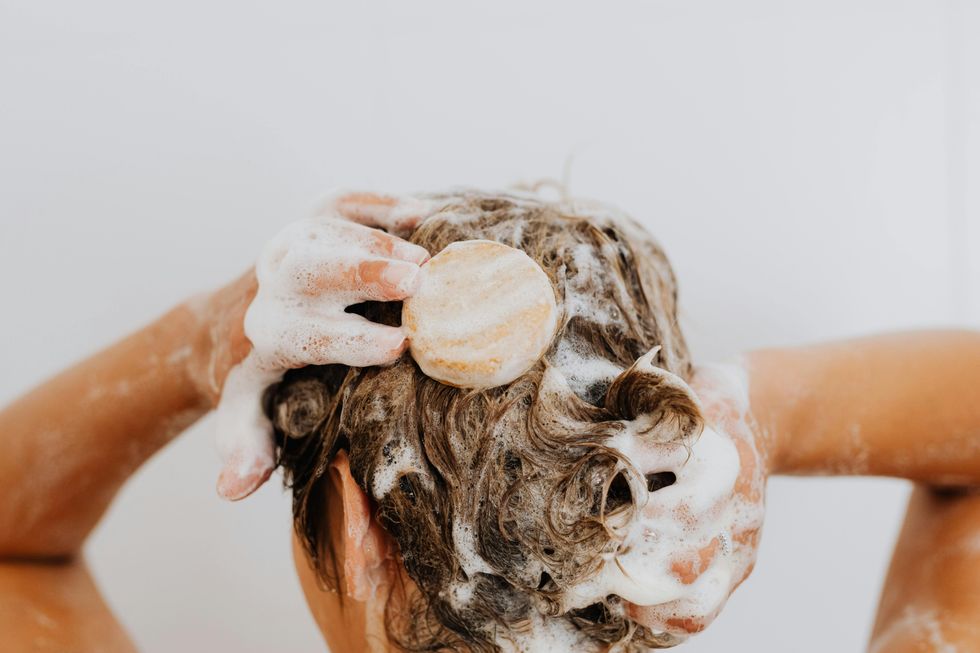
Everybody knows that great hair starts with a healthy scalp, and over time, we’ve committed more of our hair washing routine to making what’s underneath our tresses counts.
But it would turn out that your scalp can tell you a lot more than whether you’re overdue a wash; but can often be the first port of call for what’s going inside our bodies and with our health too.
While your scalp is skin like the rest of your body, it has a denser blood supply, which means increased oil production glands and hair follicles - and is often the first place you’ll get symptoms that something’s a bit off.
Some of the things you might experience include dryness, itching, flaking, burning, or even hair shedding or an increase in oil production; and they can all mean so many different things, from nutrient deficiencies, to side effects of autoimmune diseases.
Scalp analysis is becoming a more commonly-offered practice among trichologists and dermatologists, where they'll use a microscope-like instrument (also known as a dermatascope) to get a deeper look at each strand of hair on your head and the skin surrounding it.
They can then examine the health of your scalp, hair follicles, and overall hair condition.
So, what should you look out for? We consulted Dr Aamna Adel, renowned consultant dermatologist and founder of Rhute, a new scalp care brand with an 18,000-person waiting list, to debunk what each potential symptom could mean.

Oily scalp
An oily scalp is caused by an overproduction of sebum (your scalp's natural oils), and while it's normal to experience some oiliness a few days post-hair wash; if you're noticing it more frequently than usual, it could be a sign of something else.
"It's often genetic or hormonal", notes Dr Adel. "An oily scalp can be made worse by stress or underlying issues such as PCOS."
PCOS can trigger oily scalp due to raised levels of androgens, AKA the hormones that prompt an increase in oil production.
Other potential factors include product build up, irritation from excessive use of harsh chemicals, and over-washing.
Dry, flaky scalp
It's pretty normal to experience a dry scalp, particularly during the colder months when moisture isn't retained as easily. However, a persistent flaky scalp could be hinting at a skin condition - or even vitamin deficiency.
"Dry scalp can be a sign of scalp barrier imbalance, or underlying conditions such as eczema, psoriasis, seborrheic dermatitis, or even nutrient deficiencies such as iron and vitamin D", says Dr Adel.
So, what can you do to help turn things around? Dr Adel advises that dry scalp can be made worse by over-washing, or going too hard on sulphate-containing shampoos.

Hair thinning or shedding
According to Dr Adel, if you notice your hair thinning or shedding, it could be a major indicator of the state of your overall health.
"Scalp and hair are one of the first things to be affected when the body is unwell, nutrient deficient, or going through any type of stress - whether that's surgery or childbirth", she says.
"Acute shedding is called telogen effluvium, and it's when a large number of hair follicles move into the shedding phase all at once which results in acute hair loss. This usually happen 3-4 months after the stressful period.
"It can also be marker of lots of different types of nutrient deficiencies like vitamin D, iron, B12, folate - but also underlying issues like thyroid disorders."
Patchy hair loss
There's a range of things that can cause patchy hair loss - from sudden weight loss, to even wearing tight hairstyles or being stressed.
However, if you don't associate with these lifestyle factors, it's worth getting checked out.
"It can be a sign of an underlying autoimmune disorder", says Dr Adel.
Alopecia Areata is often associated with conditions like thyroid disease or coeliac disease, as these conditions can involve the immune system attacking the body's own cells, leading to hair follicle damage.

How can you find harmony in a healthy scalp and a healthy body?
According to Dr Adel, there's no one-size-fits-all approach, but there are smaller changes everyone can be making to their lifestyles.
"Ensure that you are following a well balanced diet - nutrition and scalp health go hand in hand - Poor nutrition is one of the first things to show on your scalp", she says.
"If you have a flaky scalp, you should also try to avoid moist and humid environments as this is associated with yeast overgrowth."
A yeast overgrowth on your scalp can be linked to factors such as stress or excessive oil.
She continues: "Wash your scalp more often to remove sebum, dead skin cells, pollutants, oxidants. Using the right shampoo is important - sulphates aren't the devil and deliver an effective cleanse - however if you naturally have a very dry scalp then using them everyday can lead to increased dryness.
"Don't forget to protect the scalp the way you protect your skin; UV protection is super important! I see sunburns and skin cancer of the scalp all of the time."
It turns out healthy hair no longer just starts at the scalp - but in a healthy body too.
The waiting list for Dr Adel's sold-out Rhute Density & Repair scalp serum is now open
Why not read...
Gut health study of world’s oldest person reveals lifestyle secret to longevity
Experts have pinpointed the 'ultimate luxury' - and it isn't something you can buy
How to join the indy100's free WhatsApp channel
Have your say in our news democracy. Click the upvote icon at the top of the page to help raise this article through the indy100 rankings













